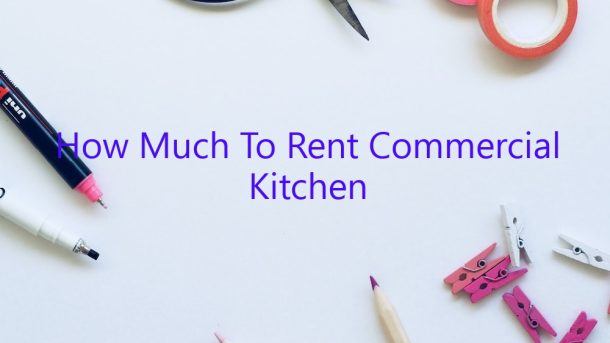When opening a food business, one of the biggest decisions you’ll have to make is what type of kitchen you’ll use. If you’re not able to use your home kitchen, you’ll need to rent a commercial kitchen. But how much does it cost to rent a commercial kitchen?
Commercial kitchen rental rates vary depending on the size and type of kitchen, as well as the location. You can expect to pay anywhere from $20 to $200 per hour for kitchen rental. In some cases, you may also be required to pay a membership fee or monthly rent.
If you’re just starting out, it may be cheaper to rent a shared kitchen. These kitchens are typically smaller and have fewer amenities than full-service kitchens. But they’re a great option for small businesses that are just getting started.
If you’re looking for a full-service kitchen, be prepared to pay a higher price. These kitchens come with all the amenities you need, including ovens, stoves, refrigerators, and dishwashers. They’re perfect for businesses that are ready to take their food business to the next level.
Before you rent a commercial kitchen, make sure you understand all the costs involved. This will help you choose the right kitchen for your business.
Contents [hide]
A shared commercial kitchen is a facility where food entrepreneurs can lease kitchen space and use commercial kitchen equipment to cook and prepare their food products. A shared commercial kitchen can be a great option for food entrepreneurs who are starting a food business but don’t have the time, resources, or space to set up their own kitchen.
There are many different types of shared commercial kitchens, and each one has its own set of rules and regulations. Before renting kitchen space in a shared commercial kitchen, be sure to read the facility’s policies and procedures so you know what is expected of you.
Some things you’ll want to consider before renting a shared kitchen space include:
-What is the kitchen’s maximum capacity?
-What is the kitchen’s hours of operation?
-What is the kitchen’s rental rate?
-What is the kitchen’s refund policy?
-What is the kitchen’s cancellation policy?
-What is the kitchen’s food safety protocol?
-What is the kitchen’s clean-up policy?
-What is the kitchen’s noise policy?
If you’re interested in renting a shared kitchen space, here are a few resources to help you get started:
The Shared Kitchen Association: This website is a good resource for finding shared commercial kitchens in the United States.
The Commercial Kitchen Directory: This website is a good resource for finding shared commercial kitchens worldwide.
The Shared Kitchen Forum: This online forum is a good resource for connecting with other food entrepreneurs who are interested in renting shared kitchen space.
Is a commercial kitchen a good business?
There are pros and cons to owning a commercial kitchen. On the one hand, it can be a great way to make money, since there is a lot of demand for space to cook food. On the other hand, there are some significant costs associated with owning and running a kitchen, so it’s not always a profitable venture.
One of the biggest benefits of owning a commercial kitchen is that there is a lot of demand for space to cook food. Whether you’re a restaurateur looking for a space to prepare your meals, or a caterer who needs a place to cook food for large events, a commercial kitchen can be a great resource. This means that you can likely charge a premium for the space, which can help to offset some of the costs of owning and running the kitchen.
However, there are also some significant costs associated with owning and running a kitchen. For starters, you’ll need to invest in some expensive equipment, such as ovens, stoves, and refrigerators. In addition, you’ll need to pay for utilities and other expenses, such as property taxes and insurance. This can add up quickly, so it’s important to do your research and make sure that a commercial kitchen is a viable business venture for you.
Ultimately, whether or not a commercial kitchen is a good business depends on a number of factors. If you’re able to charge a premium for the space, and you have the necessary equipment and infrastructure in place, then it can be a lucrative venture. However, if you’re not able to charge enough for the space, or if you don’t have the necessary equipment, then it may not be worth your time or money.
How big is an average commercial kitchen?
Commercial kitchens come in all shapes and sizes, but how big is the average one? What kind of features do they have?
Commercial kitchens vary in size, but the average one is around 700 square feet. This size can accommodate a few cooks or a large staff. They typically have a stove, oven, refrigerator, and sink. There is also usually plenty of counter space and storage.
Many commercial kitchens have additional features, such as a dishwashing area, a walk-in refrigerator or freezer, or a meat-cutting area. Some kitchens are even equipped with a pizza oven or a fryer.
If you’re opening a restaurant, it’s important to take into account the size of the kitchen. You’ll need to make sure that the kitchen has enough space for the equipment and staff you need.
How does a commercial kitchen work?
A commercial kitchen is a place where food is prepared and served for profit. The layout of a commercial kitchen varies depending on the type of food service it provides. Restaurants, schools, hospitals, prisons, and other institutions all have their own unique kitchen setup. However, there are some general features that are common to all commercial kitchens.
The heart of a commercial kitchen is the stove. There are usually several stoves in a kitchen, each with multiple burners. There is also a large oven, which is used to bake bread, roast meat, and cook other large dishes. In addition to the stove, a commercial kitchen has a variety of other kitchen equipment. This includes a refrigerator, freezer, microwave, and dishwasher.
Commercial kitchens are usually very large. They can be as big as several thousand square feet. This allows them to accommodate the large equipment, such as the stove and oven, as well as the numerous workers who are needed to prepare and serve food.
One of the most important jobs in a commercial kitchen is the chef. The chef is responsible for creating menus and preparing food. They must be able to work under pressure and be able to multitask. In a busy kitchen, the chef is often responsible for overseeing the entire cooking process.
Another critical position in a commercial kitchen is the cook. The cooks are responsible for preparing the food according to the chef’s instructions. They must be able to work quickly and efficiently to keep up with the demands of a busy kitchen.
Commercial kitchens also employ a number of other workers. These include servers, dishwashers, and cooks’ assistants. All of these workers are essential to the smooth operation of a kitchen.
A commercial kitchen is a complex and busy place. It takes a lot of hard work and teamwork to make it run smoothly. But when it does, the results can be spectacular.
Is it profitable to start a cloud kitchen?
In recent years, the food industry has witnessed a boom in the number of cloud kitchens or delivery-only restaurants. This type of business is becoming increasingly popular because it does not require a physical location, which makes it a more affordable option for entrepreneurs. However, is it really profitable to start a cloud kitchen?
There are several factors to consider when deciding whether or not to open a cloud kitchen. The first is the cost of starting up the business. A cloud kitchen does not require a physical location, but it does need a well-equipped kitchen and a team of chefs to prepare the food. The cost of setting up a cloud kitchen can be prohibitive for some entrepreneurs, especially if they are starting from scratch.
Another factor to consider is the cost of doing business. A cloud kitchen depends on food delivery services such as Uber Eats and DoorDash to reach customers. These services charge a commission on each order, which can reduce the profitability of the business.
Another issue to consider is the competition. The food delivery market is becoming increasingly competitive, and it can be difficult to stand out from the crowd.
So, is it profitable to start a cloud kitchen? It depends on a number of factors, including the cost of starting up the business, the cost of doing business, and the level of competition. However, if done correctly, a cloud kitchen can be a profitable business venture.
How does a ghost kitchen work?
What is a ghost kitchen?
A ghost kitchen is a commercial kitchen that is used solely for the production of food delivery orders. It is not open to the public and does not serve food in-person.
How does a ghost kitchen work?
A ghost kitchen works by receiving food delivery orders from restaurants, cafes, and other food businesses. These orders are then prepared and packaged for delivery by the kitchen’s staff.
Can I turn my garage into a commercial kitchen?
Garages are often used as storage spaces or for parking cars. However, they can also be turned into commercial kitchens. This can be a great option for those who want to start a food business. There are a few things to consider before making the switch, though.
The first thing to think about is the zoning restrictions in your area. Some communities prohibit the use of garages as commercial kitchens. Be sure to check with your local government to see if this is an option.
If it is allowed, you will need to make sure that your garage is up to code. This includes having the proper ventilation and insulation. You may also need to install a fire suppression system.
Another thing to consider is the cost. Converting a garage into a commercial kitchen can be expensive. You will need to install new appliances, plumbing, and wiring.
If you are able to make the switch, a garage can be a great way to start a food business. Just be sure to check with your local government and to budget for the necessary renovations.




